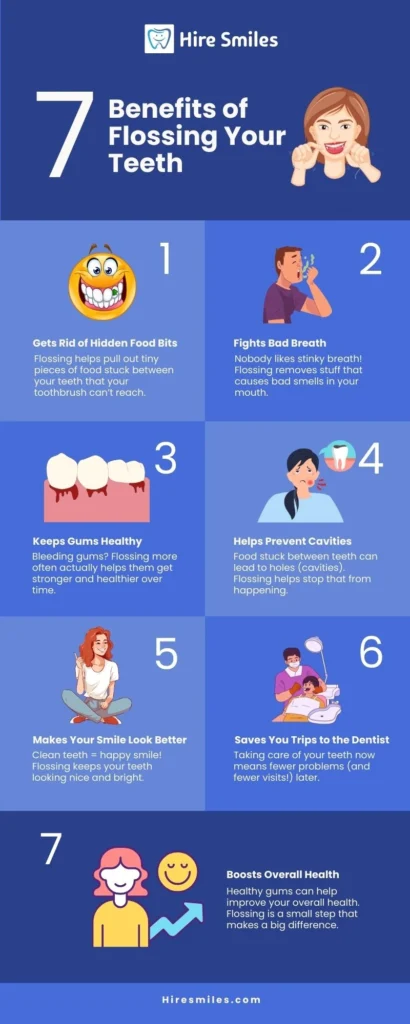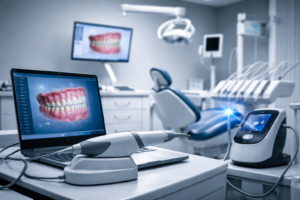Preventive oral hygiene is more than attending regular dental checkups. It’s also imperative to practice daily oral health care routines at home. This means brushing and flossing regularly. Using dental diplomacy, flossing your teeth under the gum line and in between them can be lyricism. At first, a fundamental part of long-term maintenance of the teeth and gums is flossing which not only cleans the interdental space and the side surface but also moves back the plaque production. Check the benefits of flossing daily and myths vs facts in this blog.
Benefits of Flossing Daily
Flossing your teeth has a variety of benefits and advantages. Everyone needs to maintain their oral health by brushing their teeth with fluoride toothpaste twice a day and by also flossing daily as it can help prevent gum disease and cavities, among others, if done regularly.
Prevent Gum Disease
The most important advantage of using a flush-type dental tool is the prevention of gum disease. To clarify, flossing is the best defense against gum disease. Floss does not allow plaque to adhere to our teeth and thus prevents periodontal disease, while gingivitis is set at bay. Preventive cleaning should be a part of dental consultations, especially for existing patients.
Gingivitis is an infection of the gums which might cause tooth loss and additional health problems. If diagnosed with gingivitis, you might also notice your gum tissues being red and swollen. Sometimes (especially after brushing), you may feel the taste of metallic objects in your mouth due to the presence of blood.
Similarly, they are normal complaints of old age but they can be the result of specific disorders including diabetes, smoking, stress, and pregnancy. The best way to prevent this is by practicing great oral hygiene such as brushing your teeth twice a day with fluoride toothpaste and flossing once every day. If you see any symptoms that might be gingivitis go to a dentist promptly to be treated before it gets worse!
Prevent Plaque
The next advantage of flossing is the prevention of plaque. Plaque, which is a sticky layer that develops on teeth, is a significant aspect leading to cavities and gum disease. Initially, it is formed by bacteria that stick to your teeth. Also, it is important to bear in mind the fact that teeth are not the only things that can be affected by plaque, since plaque tends to form as a result of many different bacteria exchanging sugar.
If plaque stays too long on one’s teeth, it will begin to attract minerals from the saliva which, over time, may produce cavities or gum disease if it is not properly treated. Fortunately, there are simple techniques that you can try and thus, avoid the occurrence of plaque. One of the ways is to brush after each meal which is one of the easiest methods that you can use to impact the buildup of plaque on your teeth. In addition to that, you may choose to use dental floss as it helps get rid of debris that is located between the teeth where the toothbrush icicles can never reach well.
Prevent Tooth Decay
The final advantage of flossing is making teeth resistant to decay. Tooth decay can be treated and prevented with the help of good oral hygiene, which involves tooth brushing, looking for fluoridated water, and getting dental check-ups. The harmful agent that causes the decay of the teeth is the bacteria that are present in the mouth. Moreover, the bacteria turn the sugar of the food into acid and destroy the teeth.
Every time we eat, we brush our teeth to get rid of the food and the plaque, but it is also essential to run water over our teeth so the acid has no time to settle on our teeth. The most effective method is to brush at least twice a day by using fluoride toothpaste and flossing. The basic flossing process of cleaning between teeth and using a thin thread to remove unnecessary material between the teeth is flossing. Moreover, there is also electric toothbrushing, which is an excellent way to remove the build-up plaque in the fissures of the teeth.
Hence, it is evident that regular usage of a floss every day helps in removing the stuck materials, bacteria, and plaque in those areas; otherwise, they may accumulate over time. The American Dental Association advises that one floss once every day for at least two minutes or brush their teeth three times every day for two minutes for people to accomplish good oral hygiene practices.
5 myths about Flossing Daily
Alongside brushing, flossing is one of those things we usually are lectured about by dentists. Yet, some of us either skip it or misinterpret the meaning of this procedure. Below pointers are the most popular myths about flossing daily.
You only need to floss your teeth if you notice some vegetables stuck there and need to remove them.
Not all of the tooth is cleaned by brushing alone, and its convex shape makes it impossible to scrub away bacteria lodged in the interdental of your teeth, therefore, it would not be effective. Plaque occurs even when you don’t feel or see anything between your teeth, which can be removed only by using floss to prevent such issues as tooth decay, gum disease, and bad breath.
You can choose to use mouthwash rather than floss.
Mouthwash, just like brushing, will not remove plaque between the teeth. Mouthwash being a supplemental tool to the oral care routine is a good thing as long as it is done in addition to flossing; they should not replace each other.
You can’t floss because you have braces.
While braces can make flossing more difficult after a while, it is still a necessary practice. Braces tend to make the gums prone to becoming inflamed, therefore, daily flossing helps them to remain clean and free from plaque buildup when orthodontic treatment is ongoing. For those patients who would like to opt out of traditional metal braces, other teeth straightening methods like Invisalign clear aligners also exist. Invisalign can be removed for flossing and brushing, providing the patients with an option to keep a cleaning regimen.
Your children will not be good at flossing.
The floss information is never a waste of time even for the children. That’s why if you show them how it’s done and make oral hygiene vs kids a game, you will be amazed by how fast oral hygiene will become a family habit. Comfort your children in case they find it hard to floss, or act as a role model and floss with them. If the child is less than ten years old, the parent will have to floss the child’s teeth for him/her.
Stop flossing your gums if they are bleeding.
Gums that are inflamed bleed due to increased flossing and thus should not be flossed less, but instead more regularly. The gums will be softer and will begin to bleed if they are flossed the first time, as well as pain in the mouth through the first few times of flossing. When it is done more often, you will experience reduced bleeding. To avoid momentary bleeding due to this cause, you need to floss your teeth. Alarming situations such as constantly bleeding gums may be happening because of gingivitis or gum disease. Consult your dentist in such cases.
5 Facts about Flossing Daily
Keeping your teeth healthy is an essential aspect of maintaining good health, and flossing plays a big part. Flossing is a way to clean the space between teeth, which is hard to clean with a toothbrush. These facts will give you a clear perspective, not only on how flossing positively affects your general health.
Flossing Cleans 40% of Your Teeth
Teeth have five surfaces that need to be cleaned at least once a day. Brushing the front, back, and chewing surfaces of your teeth is necessary for them to remain clean, but brushing only on one side cannot clean both sides. If you want to be sure 100% of your mouth is free of plaque, you need to brush and floss every day. Flossing is the most efficient way to get rid of plaque, a sticky film containing bacteria that deposits on your teeth.
Flossing Prevents Bad Breath
Flossing is beneficial not only for the cleanliness of your teeth but for your overall health as well. One of the pollutants produced by the microbes that hide in the plaque is smelly breath, and that’s what the floss is for: to rid the plaque. Bad breath is one of the usual partners of low self-esteem and social anxiety. You can change all that by becoming a flossing person. Bleeding is Okay At First If you are a new flosser or are flossing unsystematically.
Gums Bleeding
It proves you still need to floss more often rather than give it up. Moreover, one is encouraged to think that the gum tissue is well and getting accustomed to flossing quickly. Do you have bleeding gums that hurt when brushing? Your teeth and gums may not be as healthy as you thought. Healthy teeth and gums are essential for overall health. Call a dentist if you have symptoms of gum disease and heart disease.
Flossing Feels Like a Massage for Your Gums
It is not one thing you do, and then you will keep doing it for a long time. Flossing every day will not be a future wish. Keep the floss box visible next to your toothbrush so that remembering to floss is easy for you every time you brush your teeth. Set your phone alarm at the desired flossing time or pen a note with the message fix & floss on your mirror. You will find yourself wanting that feeling you get from flossing as time goes by.
Conclusion
If your gums bleed when you floss, don’t stop flossing—this is often a sign of inflammation, not a reason to quit. In fact, flossing more regularly can help reduce bleeding over time and improve oral health. Bleeding may occur initially because your gums are sensitive, but consistent flossing will strengthen them and reduce discomfort. However, if bleeding persists, it could be a sign of gingivitis or gum disease, and you should consult your dentist.
FAQs
What would be the consequences if you floss every day?
Blood will stop coming out of your gums. As strange as it may sound, flossing is a tool that helps decrease the frequency of gum bleeding. If you clear the bacteria around the gum line, your body will not be required to send blood cells to the area to fight the infection.
Is flossing no longer recommended?
The short answer is no. It is important to clean all sides of your teeth, even the interdental areas, where the toothbrush cannot reach, because bacteria can collect in these areas and cause gum disease. Even if flossing is poorly documented in long-term studies, only small, short-term studies seem to show little benefit in it.
Infographic






